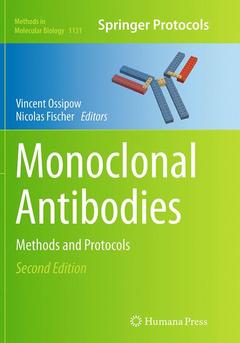Monoclonal Antibodies (2nd Ed., Softcover reprint of the original 2nd ed. 2014) Methods and Protocols Methods in Molecular Biology Series, Vol. 1131

Monoclonal Antibodies: Methods and Protocols, Second Edition expands upon the previous edition with current, detailed modern approaches to isolate and characterize monoclonal antibodies against carefully selected epitopes. This edition includes new chapters covering the key steps to generate high quality monoclonals via different methods, from antigen generation to epitope mapping and quality control of the purified IgG. Chapters are divided into four parts corresponding to four distinct objectives. Part I covers monoclonal antibody generation, Part II deals with monoclonal antibody expression and purification, Part III presents methods for monoclonal antibody characterization and modification, and Part IV describes selected applications of monoclonal antibodies. Written in the highly successful Methods in Molecular Biology series format, chapters include introductions to their respective topics, lists of the necessary materials and reagents, step-by-step, readily reproducible laboratory protocols, and tips on troubleshooting and avoiding known pitfalls.
Authoritative and practical, Monoclonal Antibodies: Methods and Protocols, Second Edition provides crucial initial steps of monoclonal antibody generation and characterization with state-of-the art protocols.
Antigen Production for Monoclonal Antibody Generation.- Method for the Generation of Antibodies Specific for Site- and Post-translational Modifications.- Immunization, Hybridoma Generation and Selection for Monoclonal Antibody Production.- Hybridoma Technology for the Generation of Rodent mAbs via Classical Fusion.- Generation of Rabbit Monoclonal Antibodies.- Screening Hybridomas for Cell Surface Antigens by High-throughput Homogenous Assay and Flow Cytometry.- Screening and Subcloning of High Producer Transfectomas using Semi-solid Media and Automated Colony Picker.- Design and Generation of Synthetic Antibody Libraries for Phage Display.- Selection and Screening using Antibody Phage Display Libraries.- Yeast Surface Display for Antibody Isolation: Library Construction, Library Screening and Affinity Maturation.- Human B Cell Immortalization for Monoclonal Antibody Production.- Using Next-generation Sequencing for Discovery of High-frequency Monoclonal Antibodies in the Variable Gene Repertoires from Immunized Mice.- Cloning, Reformatting and Small Scale Expression of Monoclonal Antibody Isolated from Mouse, Rat or Hamster Hybridoma.- Cloning of Recombinant Monoclonal Antibodies from Hybridomas in a Single Mammalian Expression Plasmid.- Monoclonal Antibody Purification by Ceramic Hydroxyapatite Chromatography.- Rapid Purification of Monoclonal Antibodies using Magnetic Microspheres.- Generation of Cell Lines for Monoclonal Antibody Production.- Expression and Purification of Recombinant Antibody Formats and Antibody Fusion Proteins.- Purification of Antibodies and Antibody Fragments using Capture Select Affinity Resins.- Reformatting of scFv antibodies into the scFv—Fc format and their Downstream Purification.- Antibody V and C Domain Sequence, Structure and Interaction Analysis with Special Reference to IMGT®.- Measuring Antibody Affinities as well as the Active Concentration of Antigens Present on a Cell Surface.- Determination of AntibodyStructures.- Affinity Maturation of Monoclonal Antibodies by Multi Site-Directed Mutagenesis.- Epitope Mapping with Membrane-bound Synthetic Overlapping Peptides.- Epitope Mapping by Epitope Excision, Hydrogen/Deuterium Exchange and Peptide-Panning Techniques Combined with in silico Analysis.- Fine Epitope Mapping Based on Phage Display and Extensive Mutagenesis of the Target Antigen.- Epitope Mapping with Random Phage Display Library.- Epitope Mapping of Monoclonal and Polyclonal Antibodies using Bacterial Cell Surface Display.- Ion Exchange High Performance Liquid Chromatography (IEX-HPLC).- Size Exclusion High Performance Liquid Chromatography (SEC-HPLC).- N-glycosylation Characterization by Liquid Chromatography with Mass Spectrometry.- Fc-Engineering of Antibodies and Antibody Derivatives by Primary Sequence Alteration and their Functional Characterization.- Labeling and use of Monoclonal Antibodies in Immunofluorescence: Protocols for Cytoskeletal and Nuclear Antigens.- Generation and Use of Antibody Fragments for Structural Studies of Proteins Refractory to Crystallization.- Antibody Array Generation and Use.
Ouvrage de 575 p.
17.8x25.4 cm
Ouvrage de 575 p.
17.8x25.4 cm
Thèmes de Monoclonal Antibodies :
Mots-clés :
aggregated monoclonals; antigen generation; crystallization chaperoning; downstream purification of IgG; immunofluorescence; monoclonal antibodies; monoclonal antibody characterization; monoclonal antibody expression; monoclonal antibody generation; monoclonal antibody modification; monoclonal antibody purification; mutagenesis; phage- or bacterial display; solid-state arrays; unstable monoclonals; antibodies


